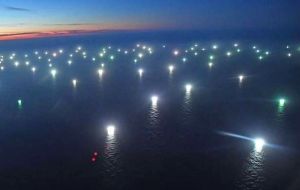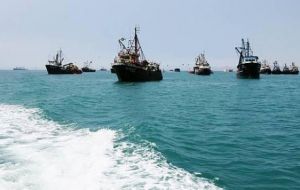MercoPress. South Atlantic News Agency
Falklands shares concerns on high seas catches as a challenge to stock assessment
 Scientist Arkhipkin said that in areas where no regional fisheries management exists, it offers limited info on number of fishing vessels as well as on the amount of catch
Scientist Arkhipkin said that in areas where no regional fisheries management exists, it offers limited info on number of fishing vessels as well as on the amount of catch  In SW Atlantic every year more than 250 jiggers and trawlers take hundreds of thousands of tons of resources including Illex and Loligo squid, hake and rock cod
In SW Atlantic every year more than 250 jiggers and trawlers take hundreds of thousands of tons of resources including Illex and Loligo squid, hake and rock cod  Recently, numbers of foreign vessels fishing for this squid on the high seas of the Eastern Pacific increased to almost 300 jiggers.
Recently, numbers of foreign vessels fishing for this squid on the high seas of the Eastern Pacific increased to almost 300 jiggers. Fishing on the high seas (*) can present a serious problem for fisheries management, but the Falkland Islands Senior Fisheries Scientist Alexander (Sasha) Arkhipkin has been making a heavy contribution to international collaborations to attempt to deal with some of that impact.
Speaking to Penguin News this week Senior Fisheries Scientist Alexander (Sasha) Arkhipkin from the FIG Fisheries Department explained that in areas where no regional fisheries management organisation exists, “it is often largely unregulated with very limited information on the number of fishing vessels as well as on the amount of catch, species composition and sizes.”
The Southwest Atlantic is such an example where every year more than 250 jiggers and trawlers take hundreds of thousands of tons of marine resources including Illex and Loligo squid, hake and rock cod. The existence of these largely unregulated catches places constraints on stock assessments of straddling stocks (shared between the high seas and an EEZ) and increases the risk of overfishing he emphasised.
Jumbo squid Dosidicus gigas is one of the largest and most important commercial marine resources of Mexico, Peru and Chile in the Pacific Ocean. Recently, numbers of foreign vessels fishing for this squid on the high seas of the Eastern Pacific increased to almost 300 jiggers.
Growing catches by this fleet raised serious concerns to fisheries management institutions in these countries.
In the last week of September 2017, the Peruvian Sea Institute (Instituto del Mar del Peru, IMARPE) organized an international workshop in Lima and invited a board of experts to advise on stock assessment methods and techniques applicable to jumbo squid.
Dr Arkhipkin was among the invitees. He made a keynote speech on squid life cycles and their implications to stock management at the beginning of the workshop that was attended by the Vice-Minister of Fisheries and Aquaculture of Peru and Director of IMARPE.
Five days of hard work, fruitful arguments and discussions produced a set of recommendations on acoustic survey designs, stock structure analysis and stock assessment techniques that will be implemented by IMARPE to improve the knowledge of squid life cycles, establish international collaboration and reveal possible impact of the high seas fisheries on squid stocks within their EEZ. (Penguin News).-
(*) Outside Exclusive Economic Zones, EEZ




Top Comments
Disclaimer & comment rules-

-

Read all commentsAccording to the Argentinians the Falkland Islands have no territorial waters...
Oct 07th, 2017 - 09:55 am +1By a ruling of the UN, Argentina will extend its maritime platform (Politica Argentina) ; New map of the maritime platform reaffirms the sovereignty of Malvinas with UN endorsement (ElCronista); Argentina enlarges its territory 35%, with a UN endorsement ...(La Capital). To add to this euphoric atmosphere the Argentine Foreign Minister stated, ''This is a historic opportunity for Argentina. We have taken a great step in the demarcation of the outer limit of our continental shelf; the most extensive boundary of Argentina and our border with humanity,'' Foreign Minister Susana Malcorra told La Nacion, which tomorrow will publicly announce the details of this resolution. (Susana Malcorra, quoted by Dinatale M, La Nacion, Argentina, 27 March 2016)
Ah, but what is the truth?
Argentina's Continental Shelf Claims and The UN CLCA Commission (1 page):-
https://www.academia.edu/33898951/Argentinas_Continental_Shelf_Claims_-The_UN_CLCS_Commission
England will return the Malvinas within 25 years.
Oct 09th, 2017 - 07:36 am -1Commenting for this story is now closed.
If you have a Facebook account, become a fan and comment on our Facebook Page!